外研版选修八Module 5 The Conquest of the Universe- Reading & Vocabulary(1)课件(23张PPT)
文档属性
| 名称 | 外研版选修八Module 5 The Conquest of the Universe- Reading & Vocabulary(1)课件(23张PPT) |
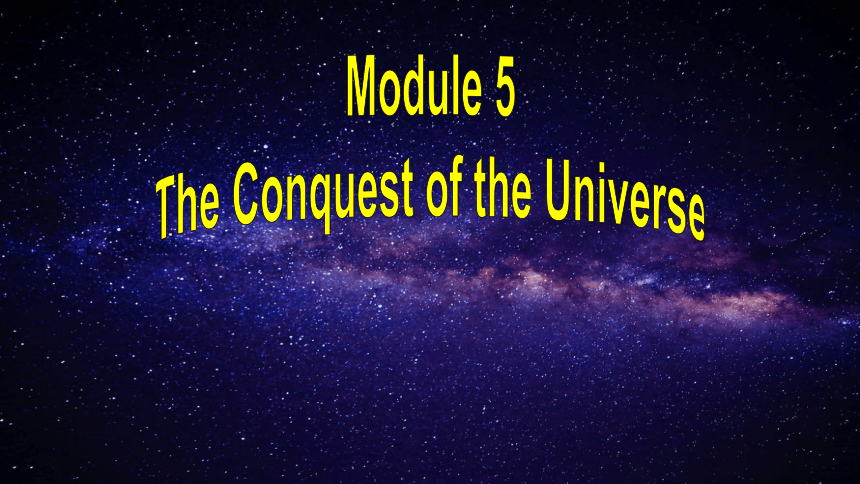
|
|
| 格式 | zip | ||
| 文件大小 | 25.2MB | ||
| 资源类型 | 教案 | ||
| 版本资源 | 外研版 | ||
| 科目 | 英语 | ||
| 更新时间 | 2022-03-09 00:00:00 | ||
图片预览

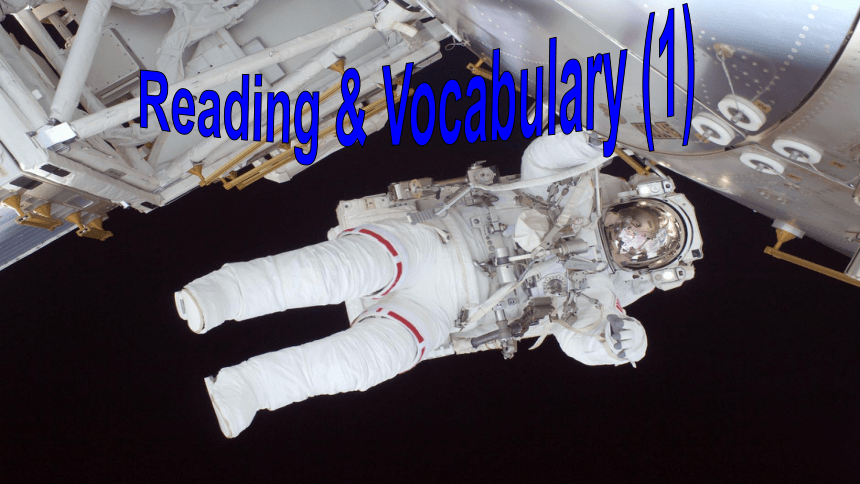
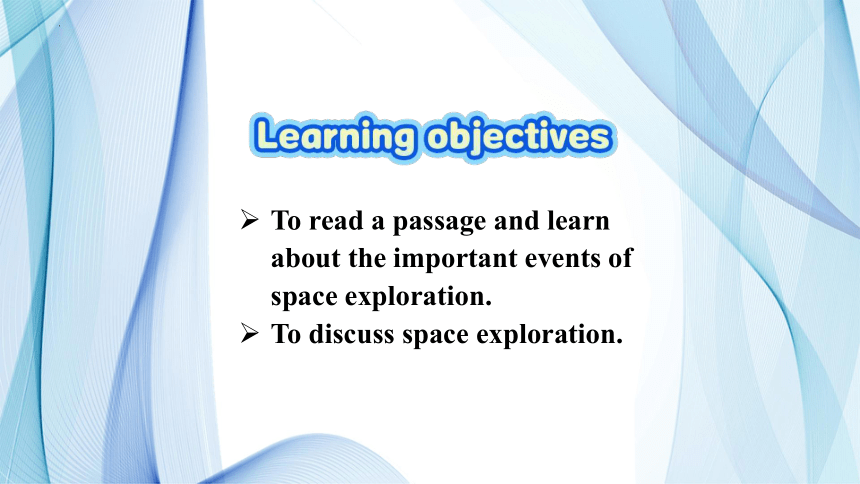
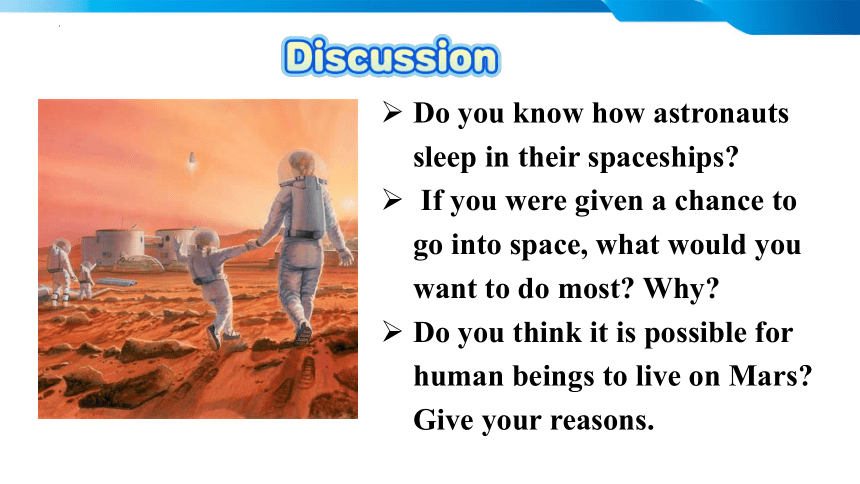
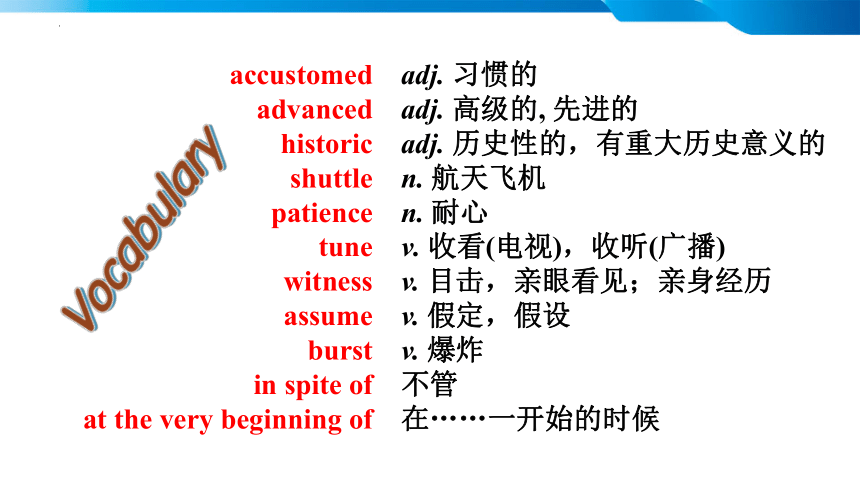



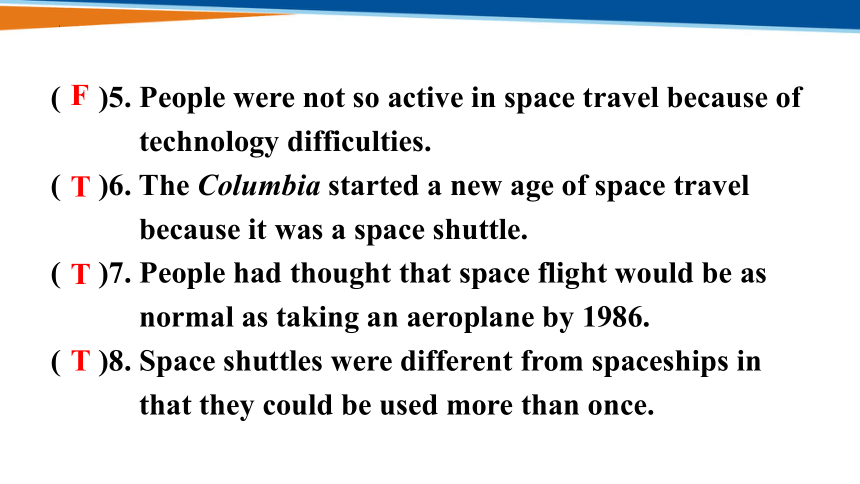
文档简介
(共23张PPT)
Module 5
The Conquest of the Universe
Reading & Vocabulary (1)
To read a passage and learn about the important events of space exploration.
To discuss space exploration.
Do you know how astronauts sleep in their spaceships
If you were given a chance to go into space, what would you want to do most Why
Do you think it is possible for human beings to live on Mars Give your reasons.
accustomed
advanced
historic
shuttle
patience
tune
witness
assume
burst
in spite of
at the very beginning of
adj. 习惯的
adj. 高级的, 先进的
adj. 历史性的,有重大历史意义的
n. 航天飞机
n. 耐心
v. 收看(电视),收听(广播)
v. 目击,亲眼看见;亲身经历
v. 假定,假设
v. 爆炸
不管
在……一开始的时候
Read Part 1 and put the following events in the correct order.
A. Neil Armstrong set foot on the Moon.
B. All three astronauts on Apollo 11 came back to Earth.
C. The Challenger exploded just over a minute after taking off.
D. All the people were shocked at the disaster of the Challenger.
E. The Columbia was launched from the Kennedy Space Centre.
F. Millions of people watched the take-off of the Challenger on TV.
G. The Columbia made a safe, controlled, aeroplane-style landing in California.
A B E G F C D
Read Part 1 and decide whether the following statements are true (T) or false (F).
( )1. The Challenger exploded on the way back to Earth.
( )2. Apollo 11 was launched from the Kennedy Space Centre.
( )3. The computer used to control Apollo 11 was quite powerful.
( )4. Christa McAuliffe gave two lessons successfully from space.
F
F
F
F
( )5. People were not so active in space travel because of technology difficulties.
( )6. The Columbia started a new age of space travel because it was a space shuttle.
( )7. People had thought that space flight would be as normal as taking an aeroplane by 1986.
( )8. Space shuttles were different from spaceships in that they could be used more than once.
F
T
T
T
Read Part 1 of the passage and answer the questions.
1. Why does the writer call the passage Space: the Final Frontier
2. How did people feel when they watched the first moon landing
3. How did people feel about space travel a few years later
Because there are no new places left on Earth for humans to discover and we have not yet explored space.
Excited but nervous.
They got used to it and thought it was safe and normal.
The space shuttle could be used many times.
4. What was different about the space shuttle
5. Why did people want to watch the Challenger take off
6. What did the Challenger disaster teach the world
Because it was a new spacecraft and it had a teacher on board as well as astronauts.
Space flight was still dangerous.
Read Part 2 of the passage. Work in pairs and describe:
1. how the boy felt before the take-off
2. what happened when the Challenger exploded
3. how he felt after witnessing the accident on TV
4. what he thought about space travel a few weeks later
He was very excited.
They all started screaming.
He was in a state of shock.
He was not sure it was worth exploring space if people were going to die.
Read Part 2 and fill in the blanks in the chart, paying attention to the changes of the author’s feelings.
excited
Smiling
strange
screaming
shock
beginning
In 1969 millions of TV viewers watched Neil Armstrong become the first man on the Moon. Apollo 11 then brought its 1. ________ astronauts safely back to Earth using a(n)
2. _________ less powerful than those used by school children today. However, because spaceships could not be used again, space travel was very 3. _________.
three
advanced technology, civilian, the Columbia, computer, expensive, exploded, 1986, three
Choose the right item from the box to complete the summary. Each item can be used only once.
computer
expensive
As a result, the public lost interest until the successful launch of the first reusable space shuttle, 4. _____________, in 1981. By the time the Challenger was about to take off in 5. ________, the shuttle was seen as part of a new more advanced age of space travel. On board was Christa McAuliffe, an ordinary teacher, who was to be the first 6. ________ in space.
the Columbia
advanced technology, civilian, the Columbia, computer, expensive, exploded, 1986, three
1986
civilian
However, it 7. ________, killing all seven astronauts inside. One of the millions who watched the launch that day remembers how his schoolboy enthusiasm for space travel disappeared: despite 8. ___________________, space travel was still dangerous.
advanced technology, civilian, the Columbia, computer, expensive, exploded, 1986, three
exploded
advanced technology
Match the words in the box with their meanings.
1. to see something happen, for example an important event, or a crime _______
2. to think that something is true, even if you are not sure _______
3. a vehicle that goes to a place and comes back _______
4. an ordinary person who is not in the armed forces or the police _______
accustomed, assume, civilian, enthusiastic, explode,
mankind, patience, shuttle, witness
witness
assume
shuttle
civilian
5. to burst with a lot of force and loud noise __________
6. very interested in something or excited by it __________
7. the ability to stay calm, especially when you have to wait for something __________
8. all the people in the world __________
9. getting used to something __________
explode
accustomed, assume, civilian, enthusiastic, explode,
mankind, patience, shuttle, witness
enthusiastic
patience
mankind
accustomed
Work in groups and discuss the questions.
1. Why do you think mankind has always been fascinated by space
2. Do you think governments should spend money sending people into space Why / Why not
3. Would you like to go on a journey into space Why / Why not
1. set foot on
2. become accustomed to
3. their hearts in their mouths
4. aware of
5. achieve a dream
6. make it
7. take off
8. no longer
9. be enthusiastic about
10. go safely up into orbit
11. a new age of
12. wonder at
13. tune in
14. a sense of excitement
15. create new interest in
16. be in shock / panic
17. in one moment
18. turn into
19. step into
20. a cloud of
21. in a state of shock
22. in spite of
23. at the very beginning of
Watch the video. Suppose you are in a spaceship, make a list of what you plan to do in space.
Module 5
The Conquest of the Universe
Reading & Vocabulary (1)
To read a passage and learn about the important events of space exploration.
To discuss space exploration.
Do you know how astronauts sleep in their spaceships
If you were given a chance to go into space, what would you want to do most Why
Do you think it is possible for human beings to live on Mars Give your reasons.
accustomed
advanced
historic
shuttle
patience
tune
witness
assume
burst
in spite of
at the very beginning of
adj. 习惯的
adj. 高级的, 先进的
adj. 历史性的,有重大历史意义的
n. 航天飞机
n. 耐心
v. 收看(电视),收听(广播)
v. 目击,亲眼看见;亲身经历
v. 假定,假设
v. 爆炸
不管
在……一开始的时候
Read Part 1 and put the following events in the correct order.
A. Neil Armstrong set foot on the Moon.
B. All three astronauts on Apollo 11 came back to Earth.
C. The Challenger exploded just over a minute after taking off.
D. All the people were shocked at the disaster of the Challenger.
E. The Columbia was launched from the Kennedy Space Centre.
F. Millions of people watched the take-off of the Challenger on TV.
G. The Columbia made a safe, controlled, aeroplane-style landing in California.
A B E G F C D
Read Part 1 and decide whether the following statements are true (T) or false (F).
( )1. The Challenger exploded on the way back to Earth.
( )2. Apollo 11 was launched from the Kennedy Space Centre.
( )3. The computer used to control Apollo 11 was quite powerful.
( )4. Christa McAuliffe gave two lessons successfully from space.
F
F
F
F
( )5. People were not so active in space travel because of technology difficulties.
( )6. The Columbia started a new age of space travel because it was a space shuttle.
( )7. People had thought that space flight would be as normal as taking an aeroplane by 1986.
( )8. Space shuttles were different from spaceships in that they could be used more than once.
F
T
T
T
Read Part 1 of the passage and answer the questions.
1. Why does the writer call the passage Space: the Final Frontier
2. How did people feel when they watched the first moon landing
3. How did people feel about space travel a few years later
Because there are no new places left on Earth for humans to discover and we have not yet explored space.
Excited but nervous.
They got used to it and thought it was safe and normal.
The space shuttle could be used many times.
4. What was different about the space shuttle
5. Why did people want to watch the Challenger take off
6. What did the Challenger disaster teach the world
Because it was a new spacecraft and it had a teacher on board as well as astronauts.
Space flight was still dangerous.
Read Part 2 of the passage. Work in pairs and describe:
1. how the boy felt before the take-off
2. what happened when the Challenger exploded
3. how he felt after witnessing the accident on TV
4. what he thought about space travel a few weeks later
He was very excited.
They all started screaming.
He was in a state of shock.
He was not sure it was worth exploring space if people were going to die.
Read Part 2 and fill in the blanks in the chart, paying attention to the changes of the author’s feelings.
excited
Smiling
strange
screaming
shock
beginning
In 1969 millions of TV viewers watched Neil Armstrong become the first man on the Moon. Apollo 11 then brought its 1. ________ astronauts safely back to Earth using a(n)
2. _________ less powerful than those used by school children today. However, because spaceships could not be used again, space travel was very 3. _________.
three
advanced technology, civilian, the Columbia, computer, expensive, exploded, 1986, three
Choose the right item from the box to complete the summary. Each item can be used only once.
computer
expensive
As a result, the public lost interest until the successful launch of the first reusable space shuttle, 4. _____________, in 1981. By the time the Challenger was about to take off in 5. ________, the shuttle was seen as part of a new more advanced age of space travel. On board was Christa McAuliffe, an ordinary teacher, who was to be the first 6. ________ in space.
the Columbia
advanced technology, civilian, the Columbia, computer, expensive, exploded, 1986, three
1986
civilian
However, it 7. ________, killing all seven astronauts inside. One of the millions who watched the launch that day remembers how his schoolboy enthusiasm for space travel disappeared: despite 8. ___________________, space travel was still dangerous.
advanced technology, civilian, the Columbia, computer, expensive, exploded, 1986, three
exploded
advanced technology
Match the words in the box with their meanings.
1. to see something happen, for example an important event, or a crime _______
2. to think that something is true, even if you are not sure _______
3. a vehicle that goes to a place and comes back _______
4. an ordinary person who is not in the armed forces or the police _______
accustomed, assume, civilian, enthusiastic, explode,
mankind, patience, shuttle, witness
witness
assume
shuttle
civilian
5. to burst with a lot of force and loud noise __________
6. very interested in something or excited by it __________
7. the ability to stay calm, especially when you have to wait for something __________
8. all the people in the world __________
9. getting used to something __________
explode
accustomed, assume, civilian, enthusiastic, explode,
mankind, patience, shuttle, witness
enthusiastic
patience
mankind
accustomed
Work in groups and discuss the questions.
1. Why do you think mankind has always been fascinated by space
2. Do you think governments should spend money sending people into space Why / Why not
3. Would you like to go on a journey into space Why / Why not
1. set foot on
2. become accustomed to
3. their hearts in their mouths
4. aware of
5. achieve a dream
6. make it
7. take off
8. no longer
9. be enthusiastic about
10. go safely up into orbit
11. a new age of
12. wonder at
13. tune in
14. a sense of excitement
15. create new interest in
16. be in shock / panic
17. in one moment
18. turn into
19. step into
20. a cloud of
21. in a state of shock
22. in spite of
23. at the very beginning of
Watch the video. Suppose you are in a spaceship, make a list of what you plan to do in space.
